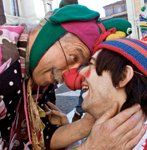The real Patch Adams
A profile of former practicing physician and current professional clown Hunter "Patch" Adams.

Adams was a practicing physician, but for about the last 25 years he's been a professional clown. If laughter is the best medicine, then he hasn't changed fields.
He flies around the world with a volunteer clown posse, usually to the places in most need of any small piece of good cheer. Recent trips include orphanages in Romania and Russia, and hospitals in Kuwait and Colombia. The children he sees have experienced the worst life has to offer, often at a very young age. "We've created a world where 35,000 children die of starvation every day," he said.
Adams' dream has been the Gesundheit Institute, which he has been working on funding for decades. It is a hospital for families. Patients and their families would live in the hospital, along with the staff and their families. Housing would be free for all employees and their families, and the pay would be equal for everyone: just $300 a month, whether nurse, doctor, or janitor.
It's quite possible for a physician to be friends with his or her patient, but for Adams it's a requirement. That's why all of Adams' first patient interviews would be three or four hours long: doctor and patient can truly bond, and set up the foundation for a strong mutual partnership.
That's not all. Adams envisions a world with single-payer health care for all, with no third-party payers. There would be no malpractice insurance. Mental health care would minimize the use of mood-altering drugs. Small wonder that the Gesundheit Institute is still unbuilt after decades of continual fundraising.
Practicing physicians who want to be more caring in their health care don't have to sign up for the whopping pay cut to make a difference, though. "In even the worst of corporate hospitals, there are saints, wonderful nurses and doctors going against all odds to try to bring love," he said.
Plenty of other physicians, Adams says, could take a note from pediatricians, and try to have some fun with their patients as well as treat them. (Adams has added extra-deep pockets to his pants, to carry a wealth of kazoos and yes, rubber noses.)
Also, try simple niceness. "Decide never to be rude again in the hospital," he advises as one positive step. This includes calling other docs out if they're nasty to a ward clerk. And then there's this one: "Every doctor can do one day of free care a week," he said.
Changing the idea of care is maybe Adams' biggest idea. Instead of treating "care" like a product that customers line up for, he treats it as a two-way process. There are those who need care-and those who need to care for others. Those who need to give shouldn't let something as minor as the bill get in the way.